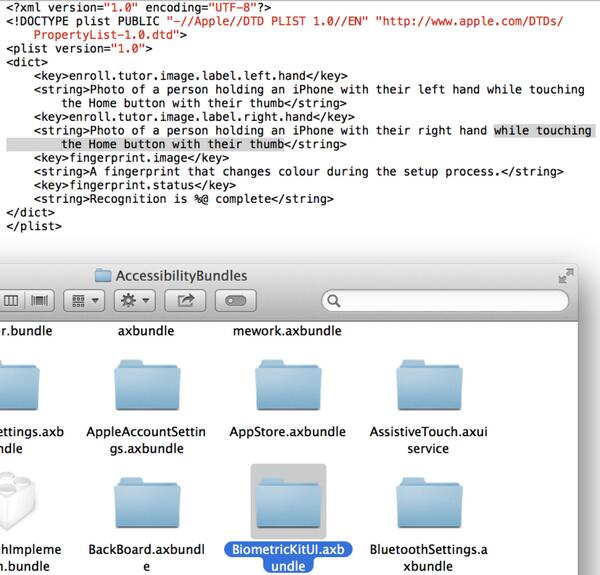One year ago, Apple bought AuthenTec, a Prague-based security company (7 Husinecká Street), for $356 million. One may now check the Czech commercial register shows two key people from Cupertino, California, aside from a Czech male and Czech female name that started the company with the basic registered capital of $10,000 (too late for great investments). ;-)

Yesterday, the Czech technological media reported that the iOS7 beta4 code contains a BiometricKitUI.axbundle folder along with some sentences suggesting that the fingerprint scanner will read your thumb when it touches the home button.
The Apple Insider (plus others) quickly added some extra comments about the new technological approach to the fingerprint reading that this Apple/AuthenTec team chose. As you may imagine, the fingerprint must be sufficiently tolerant so that it doesn't reject the actual owner when his or her fingerprint changes a bit for whatever temporary or other reasons. On the other hand, it shouldn't be too tolerant which would make the security non-existent.
There's a special concern here as well – criminals may acquire a copy of your fingerprint. The authentication in general depends on what you have, not necessarily what you are. If they have the information about your skin (they don't even need to cut your thumb for that), they could fake you even though their fake thumb isn't live and connected to your body. ;-)
The Apple Insider suggest that while the usual approaches were building on simple optical or thermal quantities, the new approach uses a combination of capacitance- and radio-frequency-based data to read the fingerprints – not just what you see on the very surface which contains some dead cells but what is actually hiding in the layer of live skin underneath the surface.

Some sources argue that a problem of coating interfering with the sensor will inevitably cause delays. Incidentally, it is also expected – because of plastic "iPhone 5C" boxes spotted in China – that Apple is going to offer a cheaper/colorful version of the newest iPhone 5S, too.
Quite generally, I would guess that there's a huge potential for various security devices that may be produced cheaply and that may be rather effective these days. For example, I think that I could design a system for a few dozens of dollars that detects someone who breaks into your house or apartment or car and quickly notifies the most appropriate person or office. Similar for a stolen smartphone or stolen laptop and so on.
Some people are bound to earn many more billions while the not-so-illegal consumers are likely to benefit.

Yesterday, the Czech technological media reported that the iOS7 beta4 code contains a BiometricKitUI.axbundle folder along with some sentences suggesting that the fingerprint scanner will read your thumb when it touches the home button.
The Apple Insider (plus others) quickly added some extra comments about the new technological approach to the fingerprint reading that this Apple/AuthenTec team chose. As you may imagine, the fingerprint must be sufficiently tolerant so that it doesn't reject the actual owner when his or her fingerprint changes a bit for whatever temporary or other reasons. On the other hand, it shouldn't be too tolerant which would make the security non-existent.
There's a special concern here as well – criminals may acquire a copy of your fingerprint. The authentication in general depends on what you have, not necessarily what you are. If they have the information about your skin (they don't even need to cut your thumb for that), they could fake you even though their fake thumb isn't live and connected to your body. ;-)
The Apple Insider suggest that while the usual approaches were building on simple optical or thermal quantities, the new approach uses a combination of capacitance- and radio-frequency-based data to read the fingerprints – not just what you see on the very surface which contains some dead cells but what is actually hiding in the layer of live skin underneath the surface.
Some sources argue that a problem of coating interfering with the sensor will inevitably cause delays. Incidentally, it is also expected – because of plastic "iPhone 5C" boxes spotted in China – that Apple is going to offer a cheaper/colorful version of the newest iPhone 5S, too.
Quite generally, I would guess that there's a huge potential for various security devices that may be produced cheaply and that may be rather effective these days. For example, I think that I could design a system for a few dozens of dollars that detects someone who breaks into your house or apartment or car and quickly notifies the most appropriate person or office. Similar for a stolen smartphone or stolen laptop and so on.
Some people are bound to earn many more billions while the not-so-illegal consumers are likely to benefit.
New iPhone likely to have a fingerprint scanner
![New iPhone likely to have a fingerprint scanner]() Reviewed by DAL
on
July 30, 2013
Rating:
Reviewed by DAL
on
July 30, 2013
Rating:




No comments: